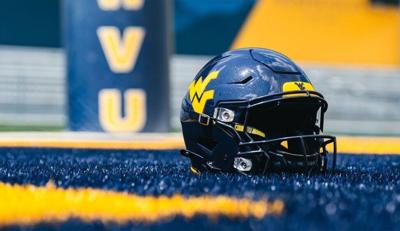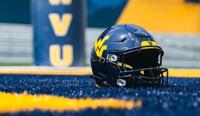
CLARKSBURG – Four West Virginia University football players seek a federal court injunction to allow them to play this season.
Tye Edwards, Justin Harrington, Jimmori Robinson and Jeffrey Weimer filed a complaint August 1 in federal court against the NCAA. All four of the players transferred to WVU during the offseason.
In the complaint, the plaintiffs accuse the National Collegiate Athletic Association of federal and state antitrust violations and of breach of contract. They want to keep the NCAA from “enforcing its arbitrary and capricious decisions, breaching its contract with its member institutions, and preventing them from participating in college sports.”
The players also say they are third-party beneficiaries of NCAA membership agreements, and each “believed they would have another year of NCAA eligibility, chose to stay in school and attempted to play football at West Virginia University. In doing so, the plaintiffs withdrew and/or forewent the National Football League draft.”
Each of the plaintiffs played multiple seasons of junior college football and had been denied waivers for eligibility for 2025. They began playing junior college football in 2018 or 2019, and all had COVID seasons, redshirt seasons and/or medical and personal issues they say makes them eligible to play this coming season for the Mountaineers.
Robinson, a defensive lineman, earned American Athletic Conference Defensive Player of the Year honors last season at the University of Texas-San Antonio. He had 43 tackles, 10.5 sacks, 17 tackles for loss and two forced fumbles in 2024.
Edwards, a running back, played the last two seasons at Northern Iowa where he rushed for a combined 1,583 yards and 11 touchdowns. He also spent a season at UTSA.
Harrington, a safety, played four years for Oklahoma and one for Washington. Weimer, a wideout, played at UNLV and Idaho State.
The complaint says the NCAA has “created a system of impediments to and series of costs for playing college sports at non-NCAA member institutions.” It calls these rules and bylaws the “JuCo Penalty.”
“A collection of NCAA bylaws … as well as the way the NCAA administers its bylaws … arbitrarily restrict the ability and eligibility of college athletes who have competed at non-NCAA institutions,” the complaint states. “The JuCo penalty is unlawful and has a substantial anti-competitive impact on college sports, drastically affecting colleges and their student-athletes.
“The JuCo Penalty discourages student-athletes from attending non-NCAA institutions. Regardless of whether a student athlete needs or desires additional time to academically prepare for a four-year college, the NCAA uses the JuCo Penalty to punish such students in favor of the NCAA.”
The complaint says this results in harm to student-athletes as well as “the creation of a ‘pride of place’ for the NCAA, which pushes student-athletes to attend an NCAA institution if at all possible because a student athlete will lose a year of eligibility regardless and, hence, be penalized for attending a non-NCAA institution.”
On December 23, 2024, the NCAA issued a blanket waiver extending the eligibility of players who had spent one or more years competing at a non-NCAA institution. But the plaintiffs say the NCAA “placed harsh limits on which players the waiver applies to.”
“As such, the NCAA refused to grant or acknowledge that there is no rational reason the plaintiffs are not eligible to play football at West Virginia University this fall,” the complaint states. “Moreover, the plaintiffs have been harmed by the NCAA’s announcement of a blanket waiver, which induced their action and/or forbearance, only to learn that the NCAA does not actually intend to eliminate its JuCo penalty.”
The plaintiffs accuse the NCAA of tortious interference, breach of contract, promissory estoppel, violation of the Sherman Act, unreasonable restraint of trade, denial of access to an essential facility, contract and combination in restraint of trade, establishment of a monopoly in violation of state law and negligence.
They seek a declaratory judgment as well as a restraining order and injunctive relief as well as damages, treble damages, attorney fees, court costs and other relief.
They are being represented by James A. Gianola, John F. Gianola and Andrew Holbrook of Lewis Gianola in Morgantown. The case has been assigned to U.S. District Judge Tom Kleeh.
U.S. District Court for the Northern District of West Virginia case number 1:25-cv-75


